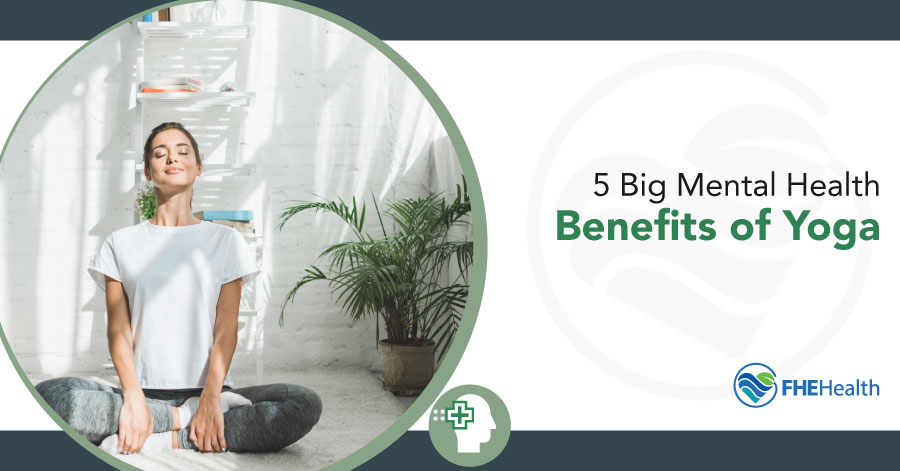
Yoga is widely believed to have gotten its start in India more than 5,000 years ago. It was first mentioned in the Rig Veda, which is an ancient text. Today, more than 20 million people across the world consider themselves regular practitioners of yoga, and it’s considered an accessible type of exercise that can be tailored to individual fitness levels and goals.
However, you may also have noticed yoga being tied to better mental health and more emotional stability. In many rehab centers, including FHE Health, it’s even offered as part of therapeutic programs. But why? It turns out that yoga as therapy can have some big benefits for your mental health.
1. It Keeps You Physically Active
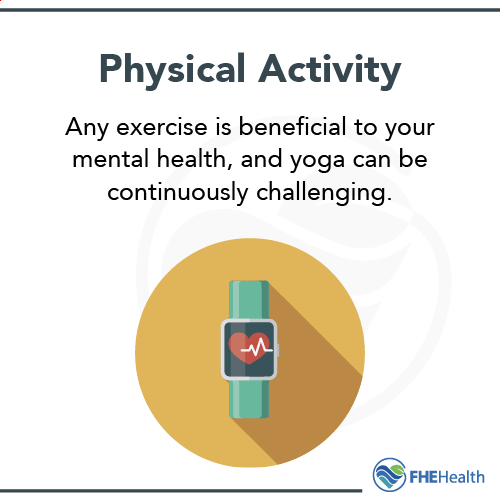 While many people use yoga as a spiritual practice, it’s also just plain good for your body. Yoga is something you can do anywhere you have enough space to lie down, and it requires no equipment other than a mat — and even that can be optional in a pinch.
While many people use yoga as a spiritual practice, it’s also just plain good for your body. Yoga is something you can do anywhere you have enough space to lie down, and it requires no equipment other than a mat — and even that can be optional in a pinch.
Any type of exercise is extremely beneficial to bettering your mental health because getting up and moving around can help you feel more productive and get some momentum going in your day. Exercise can also help regulate your hormone system which can help keep your moods more stable.
2. It Sets the Stage for Meditation
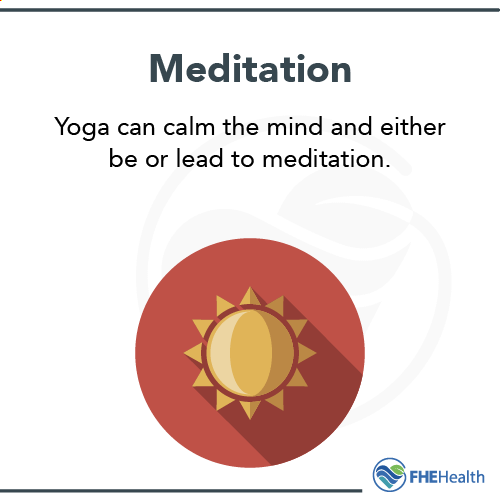 While meditation is technically different from yoga, many people practice both. Doing yoga before your meditation practice can help your body and mind settle down, which can help create a better environment for relaxation and self-reflection.
While meditation is technically different from yoga, many people practice both. Doing yoga before your meditation practice can help your body and mind settle down, which can help create a better environment for relaxation and self-reflection.
Learning how to quiet the mind and focus on the breath during meditation can have real benefits when you can translate those skills to everyday life. For those who tend to struggle with regulating their emotions or dealing with stress, it can also help you become more aware of your body and your thoughts. It can teach you how to stop and breathe through negative emotions such as anxiety, which can help with impulse control and staying on track to a sober, healthy life.
3. It Can Help Relieve Anxiety
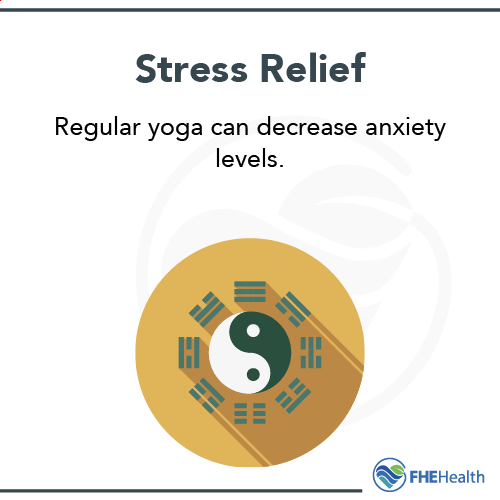 A regular yoga practice can be helpful for decreasing anxiety levels. Part of this is because it focuses on movement and breath, which can help take your attention off of anxious or obsessive thoughts.
A regular yoga practice can be helpful for decreasing anxiety levels. Part of this is because it focuses on movement and breath, which can help take your attention off of anxious or obsessive thoughts.
However, studies have also shown that it can actually have an effect on how your body perceives stress and pain. When your body and brain are able to better handle stress, be it physical or mental, it can help you be less affected by daily irritations and stay calm and centered.
4. It May Decrease Depression
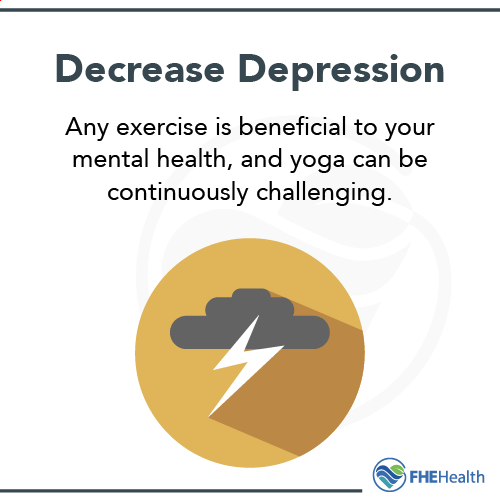 Similarly to how it works in relieving anxiety, yoga as therapy for depression can also be beneficial. As you go through the physical movements of yoga, your brain releases more serotonin, which is a feel-good hormone. This can help elevate your mood and promote feelings of calmness.
Similarly to how it works in relieving anxiety, yoga as therapy for depression can also be beneficial. As you go through the physical movements of yoga, your brain releases more serotonin, which is a feel-good hormone. This can help elevate your mood and promote feelings of calmness.
If you struggle with depression and have difficulty getting up to handle daily tasks or errands, yoga can also be helpful because it sets the stage for a routine. Maybe you get up in the mornings and immediately do 30 minutes of yoga before you shower. This helps get your blood moving and gives you the mental boost of having done something productive, which can carry over to the rest of the day.
5. It Can Help You Learn How to Stay Calm in Stressful Situations
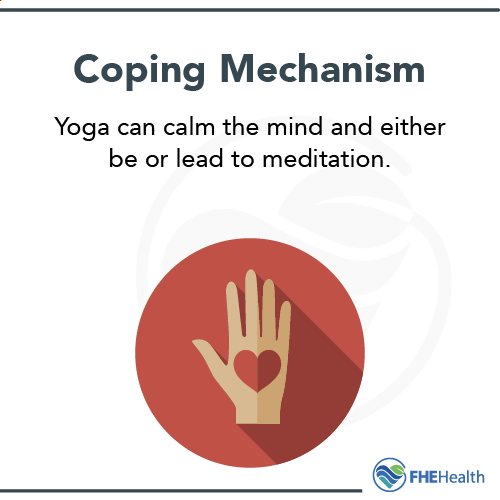 While there are many kinds of yoga, from ashtanga and hatha to iyengar and bikram, all are focused around the idea of breath. The general idea is to keep movements as fluid and smooth as possible, moving with the breath. For example, when you do the sun salutation A pose, you stretch your arms over your head as you inhale and then fold over on the exhale.
While there are many kinds of yoga, from ashtanga and hatha to iyengar and bikram, all are focused around the idea of breath. The general idea is to keep movements as fluid and smooth as possible, moving with the breath. For example, when you do the sun salutation A pose, you stretch your arms over your head as you inhale and then fold over on the exhale.
When you do more challenging or intense poses, it often involves holding a position while breathing deeply and slowly for five breaths. All of this teaches you how to focus on controlling your breath, which can help combat fight or flight instinct when faced with stressors. It also helps you learn to keep your thoughts calm, even and focused on the current moment.
All of this translates to the real world and work of staying sober during and after rehab. If you can stop in the moment when you’re feeling stressed or overwhelmed, center yourself and take a few breaths, you can make purposeful decisions on how to behave or what to say instead of reacting from a place of emotion.
Incorporating Yoga as Therapy
If using yoga as therapy sounds like something you’re interested in, the good news is that it’s easy to start doing. While you can take classes in person or online, there are also many websites that have resources on how to begin a yoga practice. Start by thinking about what you’re trying to get out of your yoga practice and choose a yoga type that matches up. It’s important to approach this with an open mind and understand that it may take some trial and error before you find something that clicks for you.
You’ll also want to invest in a yoga mat and possibly some books on the underlying theories behind the practice of yoga and why the breath and certain positions are so important. If you’re currently considering treatment facilities, looking for a rehab that has yoga therapy as an option can be a great way to get your practice started with in-person instruction and support on how to take the things you learn in the physical practice and apply them to your mental health.
Whether you are currently struggling with an addiction or are trying to help a loved one move toward a better, healthier life, FHE Health can help. Call us today to find out more about our treatment options and what life looks like at FHE Health.
Additional References:
https://www.yogabasics.com/learn/history-of-yoga/
https://yogauonline.com/yoga-news/yoga-journal-study-20-million-americans-practice-yoga






